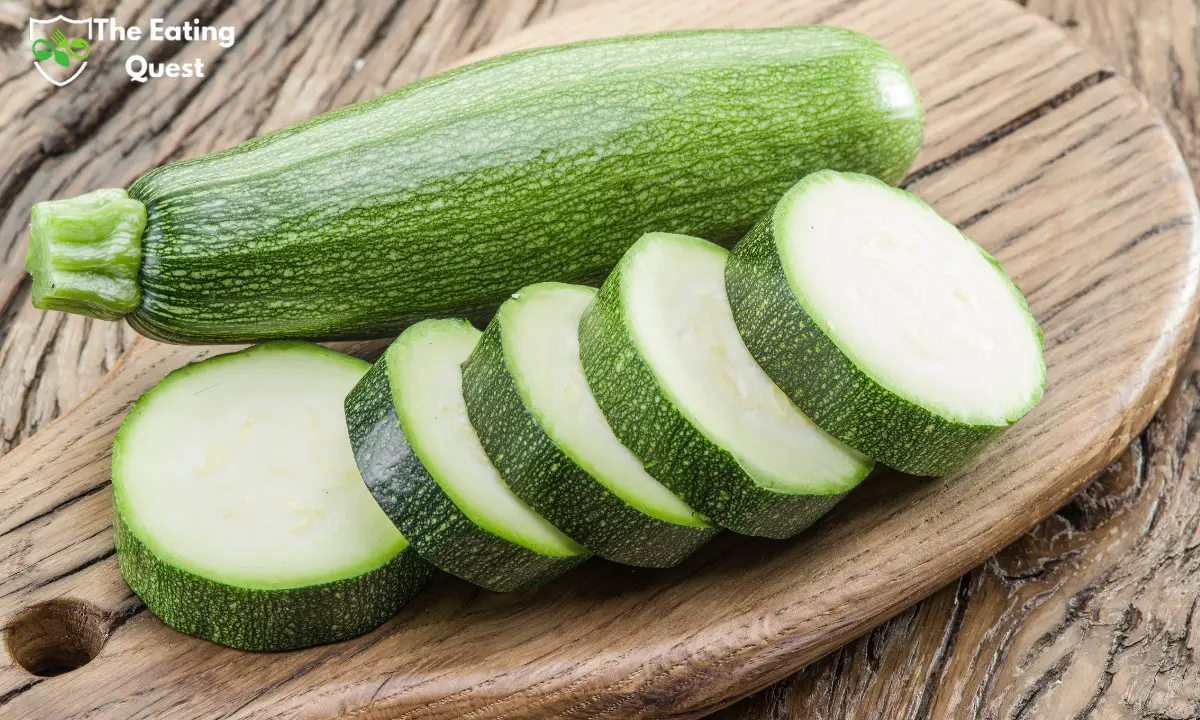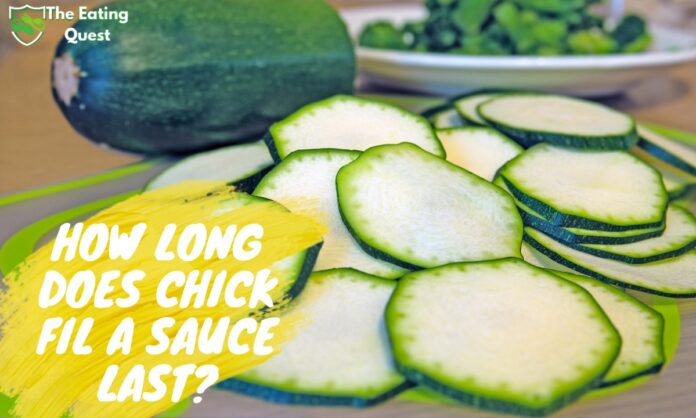Zucchini is a versatile and healthy vegetable that can be used in a variety of dishes. Whether you are making zucchini bread, sautéed zucchini, or zucchini noodles, it is important to know how long this vegetable will last in the fridge. After all, nobody wants to waste food or risk getting sick from spoiled produce.
So, how long does zucchini last in the fridge? The answer depends on a few factors, such as how fresh the zucchini was when you bought it and how it has been stored. In general, zucchini can last anywhere from 4-7 days in the fridge, but there are some tips and tricks you can use to extend its shelf life.
In this article, we will explore the best ways to store zucchini in the fridge and how to tell if it has gone bad. By the end, you will be able to confidently use your zucchini without worrying about it going bad too quickly.
How Long Does Zucchini Last in the Fridge?
Zucchini is a versatile and healthy vegetable that can be used in a variety of dishes. However, it is important to store it properly to ensure that it lasts as long as possible. Here’s what you need to know about how long zucchini lasts in the fridge:
- Whole zucchini can last for up to one week in the fridge if stored properly. It is best to store them in a plastic bag or container in the crisper drawer of your fridge.
- Cut zucchini will only last for a few days in the fridge. To extend its shelf life, wrap the cut end tightly in plastic wrap or aluminum foil.
- Cooked zucchini can last for up to five days in the fridge if stored in an airtight container.
It is important to note that the storage time can vary depending on the freshness of the zucchini when you purchased it. Always check for signs of spoilage, such as mold or a slimy texture, before using it.
To summarize, zucchini can last up to one week in the fridge if stored properly. Cut zucchini will only last for a few days, while cooked zucchini can last up to five days. Keep an eye out for signs of spoilage and store it in a plastic bag or container in the crisper drawer of your fridge to extend its shelf life.
How Long Does Cooked Zucchini Last in the Fridge?
Cooked zucchini is a versatile and healthy ingredient that can be used in a variety of dishes. However, it’s important to know how long it can last in the fridge to ensure that it’s safe to eat and doesn’t go to waste.
In general, cooked zucchini can last in the fridge for up to 4 days if stored properly. To maximize its shelf life, it’s important to store it in an airtight container or a resealable plastic bag. You should also make sure that it’s cooled down to room temperature before putting it in the fridge.
If you’re not planning on eating the cooked zucchini within 4 days, you can also freeze it for later use. Cooked zucchini can last in the freezer for up to 6 months. To freeze it, simply place it in an airtight container or a freezer bag and label it with the date.
It’s important to note that the texture and flavor of cooked zucchini may change after it’s been refrigerated or frozen. It may become softer and more watery, and the flavor may become less intense. However, it should still be safe to eat as long as it’s been stored properly and hasn’t developed any signs of spoilage, such as a sour smell or mold.
Overall, cooked zucchini can be a delicious and healthy addition to your meals. By storing it properly and keeping an eye on its shelf life, you can ensure that it’s safe to eat and doesn’t go to waste.
Can You Eat Zucchini Raw?
Zucchini is a versatile vegetable that can be eaten raw or cooked. However, the question arises whether it’s safe to eat zucchini raw. The answer is yes, you can eat zucchini raw.
Raw zucchini is low in calories and high in fiber, making it an excellent addition to salads, smoothies, and dips. It’s also a good source of vitamin C, which is essential for a healthy immune system.
When eating raw zucchini, it’s important to wash it thoroughly before consuming it. This will remove any dirt or bacteria that may be present on the skin.
If you prefer cooked zucchini, you can steam, grill, or roast it. Cooking zucchini can enhance its flavor and texture, making it a delicious addition to any meal.
In summary, zucchini can be eaten raw or cooked, and both options are safe and healthy. Just make sure to wash the zucchini thoroughly before consuming it raw.
Can You Freeze Zucchini?
Yes, you can freeze zucchini, but it’s important to note that the texture of the zucchini may change after freezing. The freezing process can cause the zucchini to become mushy when thawed, which may make it unsuitable for certain recipes.
If you plan on freezing zucchini, it’s best to use it within 3 to 6 months for optimal quality. To freeze zucchini, follow these steps:
- Wash and slice the zucchini into desired sizes.
- Blanch the zucchini by placing it in boiling water for 1-2 minutes, then immediately transferring it to a bowl of ice water to stop the cooking process. This will help preserve the color and texture of the zucchini.
- Drain the zucchini and pat it dry with a paper towel.
- Place the zucchini in a freezer-safe container or bag, removing as much air as possible before sealing.
- Label the container or bag with the date and contents.
When you’re ready to use the frozen zucchini, simply thaw it in the fridge overnight and use it in your desired recipe. Keep in mind that the texture may be slightly different than fresh zucchini, but it should still be safe to eat.
Overall, freezing zucchini can be a convenient way to preserve it for future use, but it’s important to keep in mind that the texture may change. Blanching the zucchini before freezing can help preserve its quality.
Factors Affecting Zucchini Freshness
Temperature
Zucchini is a temperature-sensitive vegetable that should be stored in the fridge at a temperature between 32°F and 40°F. If the temperature is too low, the zucchini may freeze and become mushy, while if the temperature is too high, the zucchini will spoil quickly.
Humidity
Zucchini is a high-moisture vegetable that needs to be stored in a humid environment to maintain its freshness. If the air in the fridge is too dry, the zucchini will lose moisture and become limp, while if the air is too humid, the zucchini will become moldy.
Zucchini Condition
The condition of the zucchini also plays a significant role in how long it will last in the fridge. Zucchini that is fresh, firm, and free from bruises and cuts will last longer than zucchini that is already wilted or damaged. It’s important to inspect the zucchini before storing it in the fridge and remove any damaged or spoiled pieces to prevent the spread of bacteria.
By keeping these factors in mind, you can ensure that your zucchini stays fresh for as long as possible.

How to Store Zucchini
Zucchini is a versatile vegetable that can be used in a variety of recipes. It is important to store zucchini properly to ensure that it stays fresh and flavorful. Here are some tips on how to store zucchini:
- Store zucchini in the refrigerator: Zucchini should be stored in the refrigerator to keep it fresh. Place it in a plastic bag or wrap it in a damp paper towel to prevent moisture loss. This will help to keep it fresh for up to a week.
- Do not wash zucchini before storing: Do not wash zucchini before storing it in the refrigerator. Excess moisture can cause it to spoil faster. Instead, wash it just before using it.
- Freeze zucchini for long-term storage: If you have an abundance of zucchini, you can freeze it for later use. Simply slice it into rounds or cubes and blanch it in boiling water for 1-2 minutes. Then, transfer it to airtight containers or freezer bags and freeze for up to 6 months.
- Avoid storing zucchini near ethylene-producing fruits: Zucchini is sensitive to ethylene gas, which is produced by some fruits like apples, bananas, and tomatoes. Avoid storing zucchini near these fruits as it can cause it to spoil faster.
By following these simple tips, you can ensure that your zucchini stays fresh and tasty for longer.
How to Tell If Zucchini Is Bad
Zucchini is a versatile and healthy vegetable that can be used in various dishes. However, like any other vegetable, it can go bad if not stored properly. Here are some tips on how to tell if zucchini is bad:
Appearance
The appearance of zucchini can give you a good idea of whether it’s still good to eat or not. Look for the following signs of spoilage:
- Mold: If you see any mold on the zucchini, it’s best to throw it away. Mold can spread quickly and make the zucchini unsafe to eat.
- Soft spots: If you notice any soft spots on the zucchini, it’s a sign that it’s starting to go bad. Soft spots can be a breeding ground for bacteria, which can cause food poisoning.
- Wrinkles: If the zucchini has started to wrinkle, it’s a sign that it’s past its prime. While it may still be safe to eat, the texture and flavor may not be as good as when it was fresh.
Smell
Another way to tell if zucchini is bad is by smelling it. If it has a sour or unpleasant odor, it’s best to discard it. A bad smell is a sign of bacterial growth, which can make you sick if you eat the zucchini.
Texture
The texture of zucchini can also give you a clue about whether it’s still good or not. If it feels slimy or mushy to the touch, it’s a sign that it’s gone bad. Zucchini should feel firm and smooth when it’s fresh.
Conclusion
By following these tips, you can tell if zucchini is bad and avoid eating spoiled food. Remember to store your zucchini properly in the fridge to extend its shelf life and always use your senses to check for signs of spoilage before eating it.
How to Cut Zucchini
Zucchini is a versatile vegetable that can be cooked in a variety of ways. Before you can cook it, however, you need to know how to cut it properly. Here are some steps to follow:
- Wash the zucchini under cold running water and pat it dry with a clean towel.
- Cut off both ends of the zucchini with a sharp knife.
- Depending on the recipe, you can either slice the zucchini into rounds or cut it into cubes or strips. To slice the zucchini, place it on a cutting board and cut it into 1/4 inch-thick rounds. To cut it into cubes or strips, slice it in half lengthwise, then slice each half into strips or cubes.
- If the recipe calls for removing the seeds, use a spoon or a melon baller to scoop them out.
When cutting zucchini, it’s important to use a sharp knife to ensure a clean cut and prevent the vegetable from getting crushed. Additionally, make sure to cut the zucchini into uniform pieces to ensure even cooking.
Overall, cutting zucchini is a simple process that can be done quickly and easily with a few basic steps.
How to Preserve Zucchini
Zucchini is a versatile vegetable that can be used in many dishes, whether it’s sautéed, grilled, or baked. However, if you have too much zucchini on hand or you’re not planning on using it right away, it’s important to know how to preserve it properly. Here are some methods for preserving zucchini:
Use of Preservatives
One way to preserve zucchini is by using preservatives. There are several preservatives that can be used to help keep zucchini fresh for longer periods of time. Here are a few options:
- Vinegar: You can use vinegar to preserve zucchini by creating a pickling solution. This will help to keep the zucchini fresh for several weeks. Simply slice the zucchini into thin rounds, and then soak them in a solution made from vinegar, water, and salt.
- Lemon Juice: Another option is to use lemon juice. The acid in lemon juice can help to prevent browning and spoilage. To use this method, slice the zucchini into thin rounds and then toss them in lemon juice.
- Salt: Salt is a natural preservative that can be used to keep zucchini fresh for longer periods of time. To use this method, sprinkle salt on sliced zucchini and then store it in an airtight container in the fridge.
Freezing Options
Another way to preserve zucchini is by freezing it. Freezing zucchini is a great option if you have a lot of it on hand and you’re not planning on using it right away. Here are a few freezing options:
- Sliced Zucchini: Slice the zucchini into rounds or spears, blanch them in boiling water for a few minutes, and then plunge them into ice water to stop the cooking process. Drain the zucchini and then freeze it in a single layer on a baking sheet. Once frozen, transfer the zucchini to a freezer-safe container.
- Grated Zucchini: Grated zucchini can also be frozen. Simply grate the zucchini and then squeeze out any excess moisture. Freeze the grated zucchini in an airtight container or freezer bag.
- Zucchini Puree: If you have a lot of zucchini on hand, you can also make zucchini puree and freeze it. Simply cook the zucchini until it’s soft, puree it in a blender or food processor, and then freeze it in an airtight container or freezer bag.
By using these preservation methods, you can extend the shelf life of zucchini and ensure that you always have some on hand for your favorite dishes.
Frequently Asked Questions
What is the shelf life of uncut zucchini when stored in the refrigerator?
Uncut zucchini can last up to two weeks when stored in the refrigerator. It is best to store them in a plastic bag or container to prevent moisture loss and drying out.
How should I store sliced zucchini in the refrigerator to maximize its freshness?
Sliced zucchini should be stored in an airtight container or plastic bag in the refrigerator. It is best to use it within 2-3 days to ensure maximum freshness.
What are the signs that indicate zucchini has spoiled?
Spoiled zucchini will have a mushy texture, and may also have a slimy or moldy appearance. It may also have a foul odor. If you notice any of these signs, it is best to discard the zucchini.
Is it safe to consume zucchini that has been in the fridge for over a week?
While zucchini can last up to two weeks in the refrigerator, it is best to consume it within the first week to ensure maximum freshness and quality. Consuming zucchini that has been in the fridge for over a week may increase the risk of foodborne illness.
Does refrigeration extend the longevity of zucchini compared to room temperature storage?
Yes, refrigeration can extend the shelf life of zucchini compared to room temperature storage. Zucchini stored at room temperature may only last a few days, while refrigerated zucchini can last up to two weeks.
How long can cooked zucchini be safely stored in the refrigerator?
Cooked zucchini can be safely stored in the refrigerator for up to four days. It is best to store it in an airtight container or plastic bag to prevent moisture loss and drying out.
Also Read:
How Long Does Chick Fil A Sauce Last?
Can You Make Cornbread Without Eggs?
















